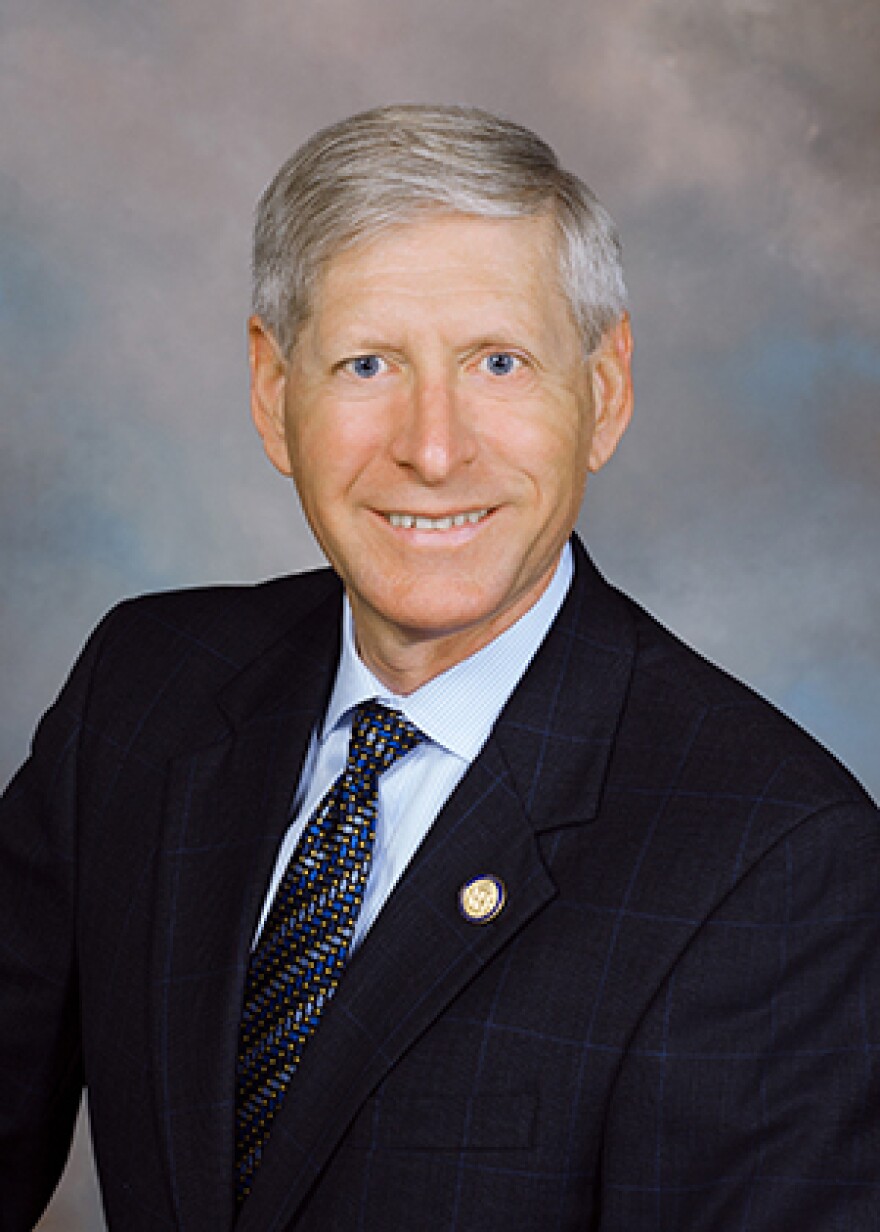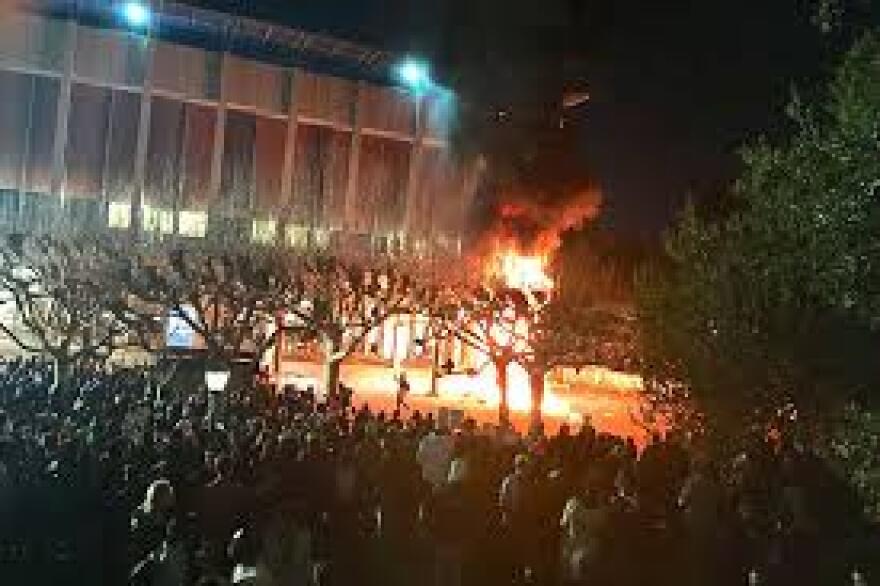The decision by administrators at Berkeley to cancel a talk by a white supremacist drew a threatening tweet from the President and criticism from a growing movement to protect the rights of almost anyone to speak at public universities.
Here in Virginia, Sandy Hausman reports the General Assembly may approve a bill that would make it illegal to keep climate change deniers and racists from speaking at state universities.
Reporter's Note: While the organization known as FIRE recorded video of an unhappy student at Yale, the group was not responsible for posting her name and personal information online. That was done by The Daily Caller, and FIRE has condemned The Daily Caller for doing so.
The issue of free speech on campus comes up from time to time – most recently at Berkeley and before that at Yale. That’s where a committee concerned with cultural sensitivity issued a memo last October, urging students to choose Halloween costumes that don’t offend.
"Like a feathered Indian headdress or a bunch of white frat boys putting on blackface," says Jim Sleeper, a lecturer in political science at Yale. " It was a memo. It was not a rule. It didn’t suggest that anyone be punished.”
Sleeper recalls a faculty member named Erika Christakis publicly objecting to what she saw as an extreme example of political correctness. Her husband also attacked the memo, leading one student to scold him publicly for being insensitive.
“It is not about creating an intellectual space!" she shrieked. " It’s about creating a home here! You are not doing that!”
The attack was recorded by a guy from the Foundation for Individual Rights in Education or FIRE – an organization bankrolled by a number of conservative groups.
“And that video was posted with the student’s name, with a photo of her suburban family’s home and its assessed value under the headline: Meet the Privileged Yale Student Who Shrieked at Her Professor," Sleeper says. " That student had to go into hiding because of all the threats she got when it went viral.”
FIRE says it did not post that information, and it condemns The Daily Caller for doing so.
Sleeper says he doesn’t condone the student’s behavior but says it led to some very productive discussions on campus, and he thinks it should have been viewed in context.
“We have just been through a presidential campaign in which the incoming president was vulgar, he invoked a lot of violence, he used his free speech to abuse and humiliate his opponents. Isn’t that be part of what’s upsetting some of the kids on campus? Isn’t there something a little bit strange about focusing so much money, attention and media on a bunch of 19-year-olds and their deans when all of this is going on in the larger public sphere?”

But others, like Virginia Delegate Steve Landes, worry that political correctness coddles students and prevents them from hearing important viewpoints. He’s introduced House Bill 1401 to prohibit public institutions of higher education from abridging the freedom of any individual to speak on campus.
“Groups try to disrupt speakers from actually having that dialogue and that civil discourse," he says. "They protest, and that’s fine. That’s their right, but we don’t expect that the dialogue at least can’t occur, because that’s what college is all about.”
Landes admits he doesn’t know of any incidents at Virginia schools, and Sleeper claims students blocking free speech is not a problem nationally, but by publicizing rare cases of rudeness and disruption, controversial groups might guarantee a chance to share their views on campus.
“It’s very much analogous to the voter fraud and voter ID campaigns," Sleeper says. " You try to find instances of voter fraud of which there are relatively few, dramatize them, and use that as an excuse to basically disenfranchise lots of people.”
At Colby College, Professor Aaron Hanlon agrees. He’s been watching what he says is an organized campaign to open universities to climate deniers and others who spout views not supported by data.
“There are particularly well-funded partisan interests vested in the notion that universities as influential institutions that tend to lean left are a threat to conservative political agendas,” Hanlon says.
On the face of it, making a law that assures anyone can say almost anything at a state school might seem reasonable, but UVA Media Studies Professor Siva Vaidhyanathan argues universities are workplaces, and they must restrict some speech to get things done. You can’t, for example, have students standing up in class, saying whatever they like, nor can you allow faculty members to push a political agenda.
“I can’t use my office or my computer to, for instance, endorse or campaign for a candidate,” Vaidhyanathan explains.
That rule would go out the window, he says, if the Landes bill is approved. Aaron Hanlon adds it’s the university’s duty to be selective.
“People pay tuition to get, if you will, a kind of curated education. When I teach a course, I don’t have infinite time, so I have to choose which material goes on and which to leave off, and I think when it comes to the campus as a whole, administrations are forced to make, and it’s their duty in fact to make similar choices.”
What’s more, he argues the First Amendment doesn’t guarantee a platform for free speech. You don’t have the right to hear from anyone, anywhere.
“Campuses aren’t prisons, which means that students are free + to explore the world of ideas both on and off campus. We don’t regulate what they look at on the Internet. If they want to involve themselves with an Alt-Right Nazi group, then they can. Just as well if they want to involve themselves with a fringe left-wing group.”
If there’s a threat to the First Amendment, Hanlon says, it’s coming not from vocal students or faculty members but from lawmakers.
“We’re seeing a spate of bills at the state level across the country, not just in Virginia but in Iowa and Missouri and Arizona, that are proposing to put restrictions on the intellectual diversity of the curriculum, the content that can be taught, the types of associations and events students can hold, the tenure and academic freedom of faculty members.”
The Landes bill was approved by the Virginia House, 76-19, and now goes to the Senate.

